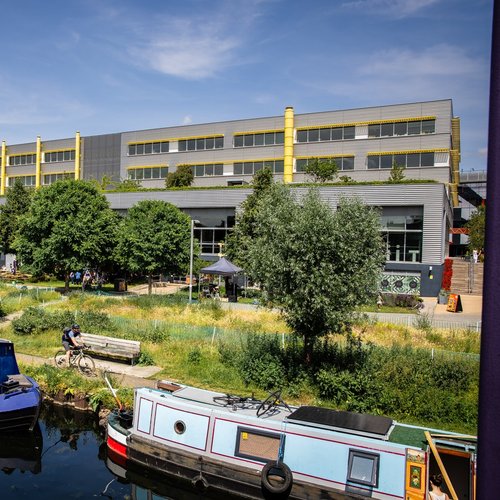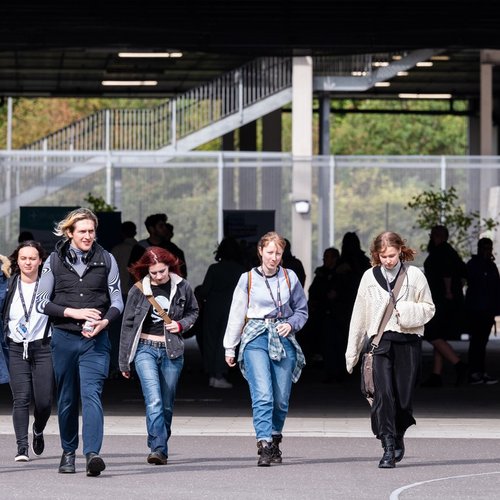6 years, 4 months ago
Here East home to new £1.2m accessible tech hub for disability-led innovation
The £1.2m East London Inclusive Enterprise Zone (ELIEZ) will feature an innovation lab at Plexal optimised for accessibility.
We're excited to announce the launch of East London Inclusive Enterprise Zone (ELIEZ), a £1.2 million project to create the UK’s most accessible technology hub alongside University College London (UCL), Plexal and Research England.
The ELIEZ will feature an innovation lab optimised for accessibility which will be used to accelerate the development of assistive technology products and services.
Both the Plexal innovation centre and UCL’s advanced engineering capabilities will be adapted as part of the design process, based on the recommendations of an expert panel led by Disability Rights UK.
The Zone is a collaboration between Here East, UCL, Plexal, Global Disability Innovation Hub, Disability Rights UK, Capital Enterprise, Greater London Authority, Loughborough University, London College of Fashion, UAL, Hackney Council, Ford Mobility, Inclusion London, and the London Legacy Development Corporation (LLDC).
Deputy Mayor of London for Business, Rajesh Agrawal, said: “The Mayor and I are committed to ensuring all Londoners can participate in our thriving economy. This exciting new project is an important step in making this a reality and creating new opportunities for disabled entrepreneurs. I’m thrilled that such a diverse group of partners has come together to create this new innovation zone and I look forward to seeing it help new startups grow and thrive.”
Andrew Roughan, Managing Director at Plexal, said: “We’re delighted to be working with UCL to create the East London Inclusive Enterprise Zone (ELIEZ), and fully support its mission to develop disability-led innovation. The market for assistive technology is huge, but what many people don’t realise is that designing for the extreme can also be a powerful way to unlock new products, solutions and innovations that benefit everyone. Our vision for Plexal’s disability-led innovation hub is to act as an ecosystem that brings together innovators with first-hand accessibility challenges, government, industry, tech giants and academia, resulting in the development and commercialisation of new businesses, as well as new ways of fairly distributing the value created.”
Pressing need for inclusive innovation
Roughly 15% of the global population has a form of disability. This is not a small proportion, yet disabled people are frequently excluded from the opportunities available to non-disabled people.
As an example of this exclusion, only one in ten disabled people has access to the assistive technology they require to go to school, work, or have a family. In the UK, the disability employment gap – the difference in the rate of employment of disabled people and non-disabled people – has remained at around 30% for a decade.
Building on the Paralympic Legacy
Dr Catherine Holloway is the Academic Director of the Global Disability Innovation (GDI) Hub, based at UCL – and key to the success of this work. The GDI Hub currently provides exceptional disability-focused teaching, research and innovation as well as delivering a UK Aid funded £20m global programme on assistive technology.
Dr Holloway said: “This exciting project builds on the legacy of the London 2012 Paralympic Games – the most successful Paralympic Games ever. More importantly it will nurture a new generation of diverse entrepreneurs and innovators who are committed to developing a better, fairer future for all people.
“Our aim is to launch 100 new startups which will then kick-start the UK’s first inclusive innovation sector and foster inclusive technological, social and economic growth for the benefit of all.”
Local impact
At the national and regional levels, the Mayor of London has identified inclusive innovation as a driver of good growth and productivity, and has made it a key ambition for London’s regional economic strategy. The GLA’s research indicates disabled Londoners are around 27% less likely to be in employment, while a TUC report highlights that disabled people typically earn approximately around £2,730 less per year.
Facilitating inclusive innovation
Dr Celia Caulcott, UCL’s Vice-Provost (Enterprise), said: “We believe that universities like UCL must work together with industry, third sector and government to solve complex social, environmental and technological challenges. The East London Inclusive Enterprise Zone (ELIEZ) exemplifies the sort of sustainable, inclusive growth we might aim for in the future.
“Improving the lives of all people with disabilities is something we as a society should absolutely be striving to achieve under any circumstances. At the same time, this project has the added benefit of effectively creating new market sectors – stimulating local economies and also increasing overall productivity.”




